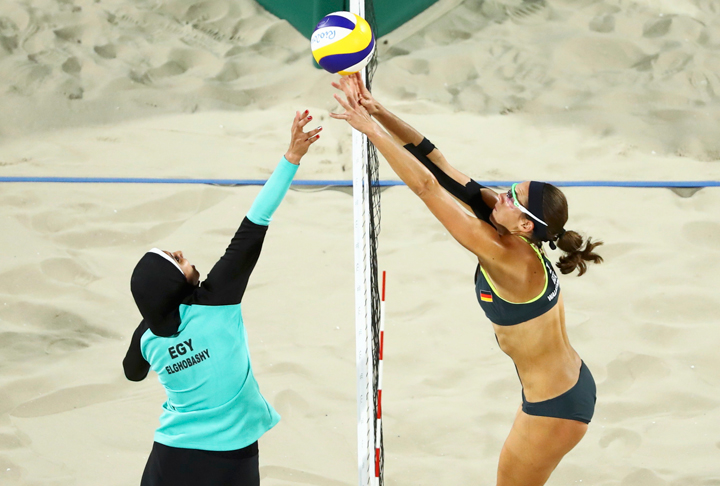When Egypt’s Doaa Elghobashy stepped onto the beach volleyball court Sunday at Rio’s Copacabana venue against Germany’s Kira Walkenhorst, the only division she was aware of was the net in front of her.

READ MORE: Canada hopes to keep momentum going on Day 4 of the Rio Games
But for spectators both in Rio and around the world, the athlete’s uniforms visibly divided the teams. Walkenhorst and her partner Laura Ludwig were clad in the usual beach volleyball attire, a sporty bikini; Elghobashy and her partner Nada Meawad were wearing long sleeves, long pants and Elghobashy wore a hijab.
Now, images of Elghobashy and Walkenhorst meeting at the net mid-play are being celebrated as an iconic moment in Olympic history.
Though many social media users took note of the stark difference in the women’s uniforms, Elghobashy didn’t.
“I have worn the hijab for 10 years,” she said after the 21-12, 21-15 loss to Germany. “It doesn’t keep me away from the things I love to do, and beach volleyball is one of them.”
The international volleyball federation (FIVB) changed uniform regulations shortly before the 2012 London Games so it wouldn’t exclude cultures that might be turned off by the standard bikinis and boardshorts.
“It was to open it up culturally,” FIVB spokesman Richard Baker said on Sunday night as the Egyptians played in their opening match of the Rio Games. “The goal was to allow more people to play the sport of volleyball.”
And in some ways, it’s worked. Baker said there were 169 different countries involved in the Continental Cup qualifying process for the 2016 Olympics, compared to 143 for London.
The Rio 2016 Games are the first time Egypt has ever qualified for either the men’s or women’s beach volleyball tournament at the Olympics.
Athletes wearing hijabs have been a big talking point in Rio.
READ MORE: Fencer Ibtihaj Muhammad becomes first American athlete to compete wearing a hijab
On Monday, Fencer Ibtihaj Muhammad made history Monday by becoming the first American to compete in the Olympics wearing a hijab. Muhammad, sporting a plain black Muslim head scarf under a red, white and blue mask, was a winner in her opening bout in the women’s sabre tournament, beating Olena Kravatska of Ukraine 15-13.
– With files from The Associated Press





Comments